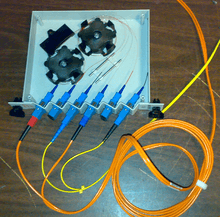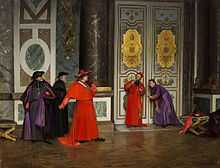Eavesdropping


Eavesdropping is secretly listening to the private conversation of others without their consent, as defined by Black's Law Dictionary.[1] This is commonly thought to be unethical and there is an old adage that "eavesdroppers seldom hear anything good of themselves... eavesdroppers always try to listen to matters that concern them."[2]
Etymology
The verb eavesdrop was originally a back-formation of the noun eavesdropper ("a person who eavesdrops") which was formed from the unrelated noun eavesdrop ("the dripping of water from the eaves of a house; the ground on which such water falls"). An eavesdropper was one who stood at the eavesdrop (where the water fell, i.e., near the house) so as to overhear what was said inside.[3][4]
Techniques
Eavesdropping can also be done over telephone lines (wiretapping), email, instant messaging, and other methods of communication considered private. (If a message is publicly broadcast, witnessing it is not considered eavesdropping.) VoIP communications software is also vulnerable to electronic eavesdropping via infections such as trojans.
References
- ↑ Garner, p. 550
- ↑ Ronald R. Kline (2000). Consumers in the Country. Baltimore, Md.: Johns Hopkins Univ. Press. p. 46.
- ↑ Shorter Oxford English Dictionary (6th ed.), Oxford University Press, 2007, ISBN 978-0-19-920687-2
- ↑ "eavesdrop". Online Etymology Dictionary.
See also
- Computer surveillance
- ECHELON
- Espionage
- Fiber tapping
- Katz v. United States (1967)
- Keystroke logging
- Magic (cryptography)
- Man-in-the-middle attack
- Mass surveillance
- NSA warrantless surveillance controversy (December 2005 – 2006)
- Opportunistic encryption
- Privacy
- Secure communication
- Surveillance
- Telephone tapping
- Ultra
External links
 The dictionary definition of eavesdropping at Wiktionary
The dictionary definition of eavesdropping at Wiktionary Media related to Eavesdropping at Wikimedia Commons
Media related to Eavesdropping at Wikimedia Commons
| ||||||||||||||||||
